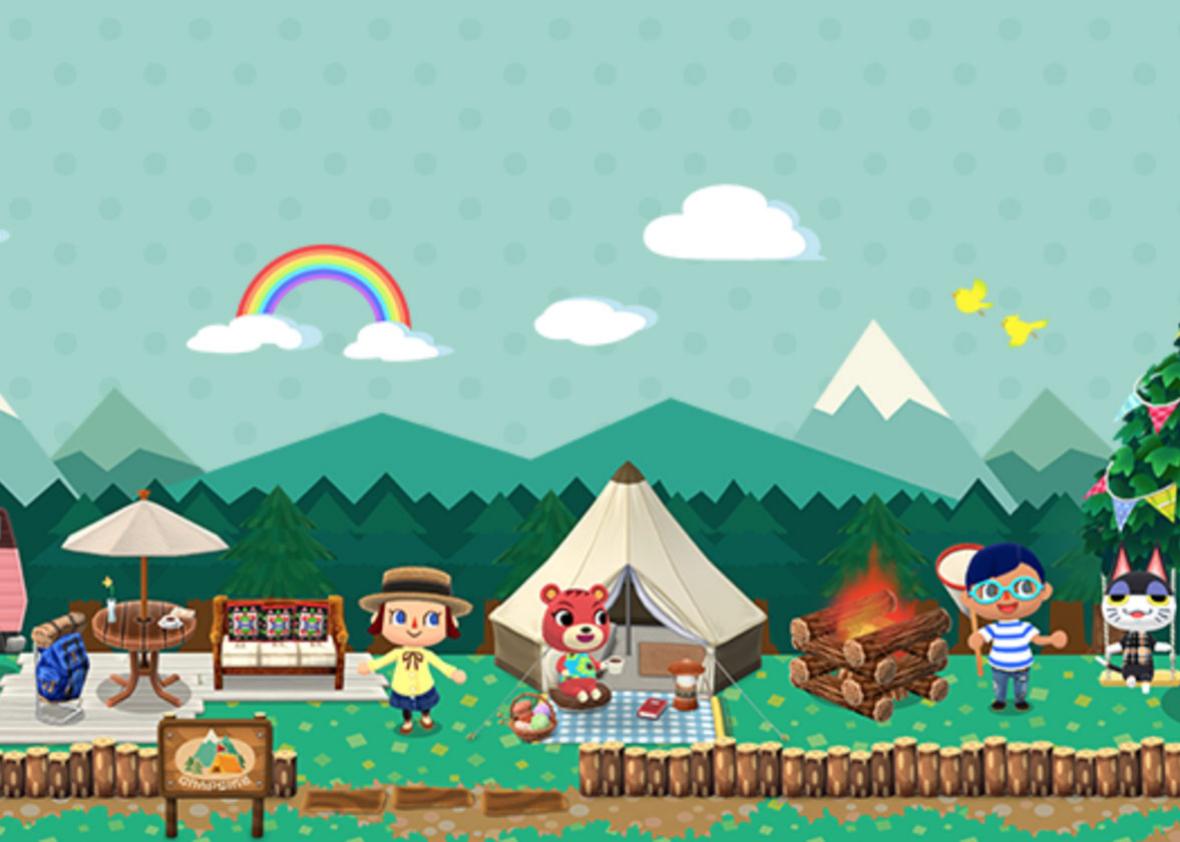It took me about 90 minutes before I got so bored, frustrated, and maybe a little hurt by my animated woodland critter friends that I deleted Animal Crossing Pocket Camp from my iPhone. Judging by the reaction to the recently released mobile version of the beloved Nintendo franchise, I’m not alone.
Like many others, I moved from disappointment that the app did not live up to my nostalgic expectations to something more like resentment over the fact that it exists at all. The app took up way too much storage space on my phone. It triggered a deep-seated longing for the original, which I played on the GameCube console as a kid, but did not deliver any emotional dividends. In its new iteration, it required hours of continuous play, which I’m simply unwilling to commit to a mobile game. And even still, none of these things are what prompted me to finally delete the app. I deleted Pocket Camp because it’s a capitalist hellscape disguised as a millennial playground populated by fake friends. And, frankly, who needs more of that?
For those who have never played, Animal Crossing was first released by Nintendo in the United States in 2002. It’s always been billed as a life simulation game, but in the past, it’s been way more friendly, funny, and cute than anything I’ve seen on Earth. Synched with a real calendar, the world of Animal Crossing is populated by anthropomorphic animals. Using a tiny avatar, the game player befriends, trades fish and fruit, and celebrates holidays in real time with caustic cats, endearing dogs, and gossipy birds. A critical and commercial success, it’s spawned several new versions of itself for a variety of gaming consoles. And last week, it came to the app store.
Pocket Camp, the mobile version of the game, looks at first glance like the previous generations of Animal Crossing. But even though the serene woodland settings remained intact, it seems like everything else has totally changed. As cookbook queen and Twitter maven Chrissy Teigen pointed out, the endless friend-making potential that was always at the heart of Animal Crossing now has a serious dark side:
That’s in part because Pocket Camp players are sent on elaborate—and time-sensitive—missions to retrieve objects that can be traded for other goods and maybe some affection. While this cutesy barter-based economy has always been a hallmark of Animal Crossing’s world, it’s changed course in the new app version. As Sam Machkovech pointed out in his searing review for Ars Technica, earlier versions of Animal Crossing allowed you to hop in for some menial tasks every few days. Now, the mobile game makes you do menial tasks for hours on end. This is not only seriously rude, it’s also really boring, with one tweet comparing Pocket Camp to a day in the life of an UberEATS delivery driver.

Nintendo
But that’s not all. Mobile game players are also forced into a sort of self-conscious consumerism. In Pocket Camp, you don’t just make friends: You buy them. In order to get an acquaintance to visit your campsite, thus cementing your friendship, players are forced to buy the exact right home furniture. Without a certain hammock or a special rug, the fake friends that populate Pocket Camp won’t even consider hanging out with you—or in actuality, passing out on your sofa without your permission, which is apparently what hanging out means in this game.
Teigen certainly nailed the social pitfalls of the game. But undergirding those social pitfalls is Pocket Camp’s real problem—the free-to-play financial model it’s based on. In the traditional Nintendo game, players had to make one-time investments, in the gaming console and the purchase of each individual game, but now anyone with a smartphone can play gaming apps for free. To compensate for this, Nintendo (and countless other mobile game developers) make players pay real world money for fake game world money. As a result, the real-life rich get game upgrades that poorer players have to earn by executing tedious tasks.
While this revenue-generating model can certainly be blamed for some of Pocket Camp’s worst qualities (and the instantaneous creation of economic classes amongst its players), for me, the mobile game has called into question the premise of the entire Animal Crossing franchise. For one thing, in every iteration of the game, home ownership is basically a requirement. That’s probably because fixer-uppers take both time and creativity—a magic combo when you’re trying to keep people playing a simulation game. But to do this, characters take out immense loans. They then barter for things that would improve that home, like wood or wallpaper. And, like oh so many Americans, once they pay off their first mortgage, they immediately take on another one (in past games, from adorable slum lord Tom Nook) to fund an upgrade to a bigger, better house. Living outside your means has, in other words, always been the point.
Another flaw I didn’t recognize as a 10-year-old with a GameCube was Animal Crossing’s tacit approval of unbridled resource extraction. Refurbishing a house, as you yourself may know, is really hard. So is making friends. In every version of the game, the solution is to shake down a tree for its fruit or empty the ocean of fish. Then you get to trade your probably-stolen apple or dubiously-sourced squid for some paint or whatever. While the game takes place in an unindustrialized quasi-wilderness, it still somehow encourages unsustainable practices and untenable consumerist values.
Ultimately, what has made Animal Crossing so lovable—and now, so horrible—is that it really is a simulation of life, albeit populated by sweeter and simpler characters. While none of us are actually friends with bipedal bears fluent in the English language, we all want love and, let’s face it, better, nicer, shinier things. As a kid, the game felt appropriately aspirational—who didn’t want to grow up and find themselves in a cute, generous community full of interesting collectables and constant learning? But as an adult, spending real money to play an ostensibly “free” game on my iPhone in the depths of a subway tunnel, Animal Crossing: Pocket Camp didn’t feel like a fun escape anymore. It was just a reminder of how little progress we’ve made.
